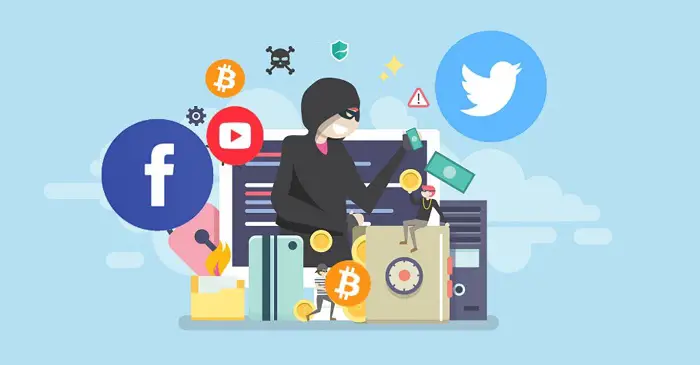Internet scams quickly become familiar, with victims losing thousands of dollars per day. Individuals and companies are at risk of online crime, and studies show that older adults are at a higher risk. Did you know you can use the internet safely?
We should be aware of social media scams, Robocall, and Coronavirus-Related Emails scams. If you ever fall into this trap, file a complaint with the Internet Crime Complaint Center (IC3).
One of the best ways to be secure while browsing the internet is to understand common internet-based scams. Let’s find out more information below.
Table of Contents
Social Media Scams
Besides the never-ending comic and how-to videos nearly everybody posts, social media has been awash with many posts, including false vaccination data, sham coronavirus tests, and counterfeit Covid-19 cures.
According to researchers from California, approximately 2,000 unethical social media posts were connected with financial scams. This was associated with the pandemic between March and May 2020. To avoid social media scams, refrain from deals that appear overly good. Be on the lookout for very cheap products that promise overnight results. Also, promotions that feature bulk sales or rapid and limited stock. All of those could be a scam. Watch out for imported products because not all of them are legitimate.
Imported medicine, COVID-19 tests, and vaccines can be risky on healthcare-related matters, and users should be careful before trusting and even using them. Besides being complex, selling such coronavirus-based health products abroad is not legal.
It’s about time social media sellers adopt actual stores to protect their businesses and keep potential customers secure. Avoid buying products directly from social media pages. Instead, search for their store or move on to the following advanced online seller with a legalized store.
To further safeguard your online presence, consider taking proactive steps to remove your personal information from the internet. Services like Incogni offer comprehensive solutions to remove your personal information from the internet.
Robocall
The pandemic forced many people to remain at home. Many scam callers act as charities or government agencies, and citizens may trust such organizations with their financial and personal information. The FTC (Federal Trade Commission) reported over 131,000 complaints on pandemic-related fraud calls. Still, that is a small proportion compared to the over three billion robocalls American residents received at the pandemic’s peak. To avoid robocall scams, consider ignoring any call from unknown numbers. Allowing the call to go to voicemail is one way of knowing whether or not the caller is genuine.
Friends, for example, will leave you a message. However, if you can’t recognize the number, proceed to block and report it as a robocall scam. Always filter scam calls out. Many mobile phones have an app or feature that allows you to filter. Use this to filter unknown numbers and callers that may be scam robocalls. The FTC has a detailed guide that you can use to block landlines, iOS, and Android phones.
Coronavirus-Related Emails
The current pandemic has affected day-to-day life in various ways, including threats to internet security. A rising trend is the increasing number of scams pretending to be the CDC (centers for disease control and Prevention). These offer deals on Covid-19-related products and sell fake cures.
One of the most effective ways of avoiding this scam is to strengthen the security of your devices. Whether you use mobile or iOS devices, you can improve their safety by installing a robust VPN (Virtual Private Network.) Did you know you can use a VPN on Windows to boost the security of your personal computer or laptop? A reliable VPN hides your IP address from third parties and your ISP. It also blocks any loopholes denying cyber criminals any chances of compromising your information or forwarding you scam emails.
You can avoid Coronavirus-related scams by deleting emails claiming to be from an official origin. Consider visiting the organization’s website or official pages for genuine and up-to-date information and current news. Do not click links in emails from suspect sources. Look for excellent and real deals to avoid safety threats. Also, see this Yahoo Format For Yahoo to get more ideas.
What Action Should you Take if you get Scammed?
As technology advances, hackers are using new methods of scamming people. Be on the safe side and be careful when browsing the internet.

If you are a victim of a cyber scam, collect all the required information about the fraud. Secondly, file a complaint with the Internet Crime Complaint Center (IC3). An expert will analyze and research the protest and spread information to the relevant regulatory and law enforcement agencies.
See Also: 14 Best Free & Paid Secure Password Generator Tools
FAQS
How can I identify an internet scam?
Look for warning signs such as unsolicited requests for personal information, promises of large sums of money for little effort, requests for payment through unconventional methods, or poor grammar and spelling in communications.
What should I do if I encounter an internet scam?
If you encounter an internet scam, do not engage with the scammer. Report the scam to the appropriate authorities or platforms, and if you have provided personal information or financial details, contact your bank or credit card company immediately.
How can I protect myself from internet scams?
Protect yourself from internet scams by being cautious online, using strong and unique passwords, keeping your software and devices up to date, avoiding suspicious emails and links, and educating yourself about standard scam techniques.
Are there specific types of internet scams to be aware of?
Yes, common types of internet scams include phishing scams, advance-fee fraud, online shopping scams, pyramid schemes, and romance scams. Stay informed about these scams and their tactics to protect yourself better.
Can I recover money lost to an internet scam?
It can be challenging to recover money lost to internet scams. However, if you act quickly, report the scam, and provide any relevant information to law enforcement, there may be a chance of recovering some funds. Contact your local authorities for guidance.
How can I report an internet scam?
Report internet scams to your local law enforcement agency, the Federal Trade Commission (FTC), or the Internet Crime Complaint Center (IC3). Provide as much information as possible, including any emails, messages, or documentation related to the scam.
See Also: Free Malware Removal Tool For Windows In 2023 [Top 10]
Conclusion
Discuss popular internet scams with your loved ones and let them understand the importance of reporting similar cases. Recommend reliable antivirus software and encourage them to use VPN for enhanced protection.
See Also: Top 8 Indicators Of Compromise & How To Resolve Them





